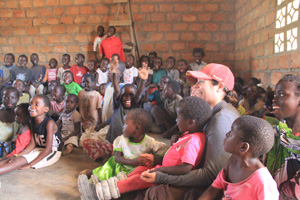Sara Waldvogel joined Hands at Work as a short term volunteer in September 2011. She now works as part of the Hands at Work US International Office, raising up and supporting advocates who partner with vulnerable communities in Africa.
 I had the privilege of coming to South Africa, along with 11 others from around the globe in September 2011. We spent our first five weeks walking together in South African communities and learning from other Hands at Work long term volunteers. Following orientation, I was fortunate to go to Kitwe, in Zambia to work with and learn from local Hands at Work leaders like Blessings Sambo and Towela Lungu.
I had the privilege of coming to South Africa, along with 11 others from around the globe in September 2011. We spent our first five weeks walking together in South African communities and learning from other Hands at Work long term volunteers. Following orientation, I was fortunate to go to Kitwe, in Zambia to work with and learn from local Hands at Work leaders like Blessings Sambo and Towela Lungu.
During my time in Africa, I met children who broke my heart. I became friends with Care Workers who were giving all they had and wished they could give more. I lived with Hands at Work local leaders in Zambia who took me into their homes as family. I stayed with a fourteen-year-old girl who gave me her own plate of food which was almost all she had left. I walked through communities alongside servant-hearted leaders in whom I saw an exhibition of the love of Christ to a degree I hadn’t known was possible. I was inspired to love in the same way.
By mid-December, I was back home in New York. There was no denying that I had changed, but I wondered what was next. I had returned to a culture that seems to prioritize self-advancement with little time to devote to the poor. Except that there is need in every part of the world. I realized that it takes a lot of effort to live a life of service to the poor in a place where it is easy to ignore that there is need. Many people in New York feel that the poor just aren’t trying hard enough to survive and thrive. Throughout the Gospels, we see Jesus devoting His life to people who others said didn’t deserve help. Walking with Care Workers in Africa opened my eyes to the truth that we are all called to do the same.
While I had a new passion for the poor and vulnerable in New York, I would never forget the children I met in South Africa and Zambia. But knowing how to help them from so far away was difficult, but I knew I had to find a way. I decided to become an Advocate for Hands at Work. An advocate is someone who pleads on behalf of another. I felt like this was what I could do for the children I had met – speak up on their behalf. I believe an advocate is someone who lives out what is written in Proverbs 31:8-9, which says, ‘Open your mouth for the mute, for the rights of all who are destitute. Open your mouth, judge righteously; defend the rights of the poor and needy.’
I also wanted to encourage others to join me in advocating for Africa’s poorest children by finding sponsors for a specific community and beginning a long term partnership of support, prayers and funding for that community.
In truth, I find it difficult to ask people to give money to my cause. Even though there are children in Zambia who I would say are ‘my children’, it is very hard for me to ask people to sponsor them. Some people have a gift for fundraising; I feel like I don’t! I have asked myself the question, ‘so how do I advocate for these children if I don’t directly ask people for money?’
Hands at Work has a saying, "We are before we do". Over the last two years, many people have asked me why I do what I do, or they ask me about Africa, or they ask me why I waste time on people from whom I may never see the fruit of my investment. I see these as great opportunities to talk about Hands at Work and our vision. People see how much I love Hands, and in turn, they want to be a part of it.
Being an advocate is not always easy. I often want to get results quickly and it doesn’t always happen. I want to be supporting multiple communities, and it’s not happening just yet. People in cities like New York have plenty of money to give to needy children in Africa, but God doesn’t want them to give money because they can; He wants them to give money because they are filled with His love and can’t help but give to the poor. Isaiah 58:10 says that ‘if you pour yourself out for the hungry and satisfy the desire of the afflicted, then shall your light rise in the darkness and your gloom be as the noonday.’
God wants us to pour ourselves out for the hungry and the afflicted. I can testify to the truth that is found in this verse. God has changed my life and I’ve never been happier. As an advocate, I feel that my main role is to live this out in front of people in New York and pray that God uses that to further His kingdom. If it results in sponsorship money for Hands at Work, I’m thrilled, but more than that, I pray that it results in people around me wanting to pour themselves out for the poor, whether it’s in Africa or New York.























